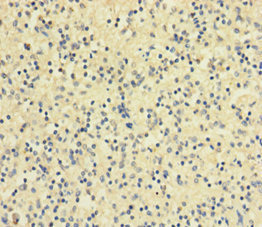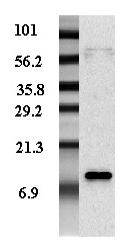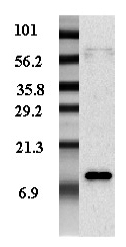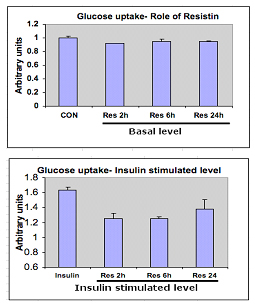anti-Resistin (human), mAb (HRES106)
AG-20B-0076
ApplicationsELISA
Product group Antibodies
ReactivityHuman
TargetRETN
Overview
- SupplierAdipoGen Life Sciences
- Product Nameanti-Resistin (human), mAb (HRES106)
- Delivery Days Customer10
- ApplicationsELISA
- CertificationResearch Use Only
- ClonalityMonoclonal
- Clone IDHRES106
- Concentration1 mg/ml
- Estimated Purity>95%
- Gene ID56729
- Target nameRETN
- Target descriptionresistin
- Target synonymsADSF, FIZZ3, RENT, RETN1, RSTN, XCP1, resistin, C/EBP-epsilon regulated myeloid-specific secreted cysteine-rich protein precursor 1, adipose tissue-specific secretory factor, c/EBP-epsilon-regulated myeloid-specific secreted cysteine-rich protein, cysteine-rich secreted protein A12-alpha-like 2, cysteine-rich secreted protein FIZZ3, found in inflammatory zone 3, resistin delta2
- HostMouse
- IsotypeIgG2a
- Protein IDQ9HD89
- Protein NameResistin
- Scientific DescriptionMonoclonal antibody. Recognizes human resistin. Does not cross-react with mouse resistin. Applications: ELISA. Isotype: Mouse IgG2akappa. Clone: HRES106. Liquid. In PBS containing 0.02% sodium azide. The adipokine resistin which belongs to a family of cysteine-rich C-terminal proteins known as resistin-like molecules (RELM; RELMalpha/FIZZ 1 and RELMbeta/FIZZ 2) of FIZZ (found in inflammatory zone) that are thought to be involved in inflammatory processes. Previous studies in mice showed that resistin impairs glucose tolerance and insulin action. In addition, resistin also inhibits adipogenesis in murine 3T3-L1 cells. Therefore resistin has also been proposed as an adipocyte-secreted factor thought to link obesity and T2DM. Resistin is secreted by obese subcutaneous adipose tissue and impaired myotube thickness and nuclear fusion by activation of the classical NF-kappaB pathway. In human, resistin levels are increased in the serum of obese individuals and resistin is used as a severity marker of asthma. - The adipokine resistin which belongs to a family of cysteine-rich C-terminal proteins known as resistin-like molecules (RELM; RELMalpha/FIZZ 1 and RELMbeta/FIZZ 2) of FIZZ (found in inflammatory zone) that are thought to be involved in inflammatory processes. Previous studies in mice showed that resistin impairs glucose tolerance and insulin action. In addition, resistin also inhibits adipogenesis in murine 3T3-L1 cells. Therefore resistin has also been proposed as an adipocyte-secreted factor thought to link obesity and T2DM. Resistin is secreted by obese subcutaneous adipose tissue and impaired myotube thickness and nuclear fusion by activation of the classical NF-kappaB pathway. In human, resistin levels are increased in the serum of obese individuals and resistin is used as a severity marker of asthma.
- ReactivityHuman
- Storage Instruction-20°C,2°C to 8°C
- UNSPSC41116161







